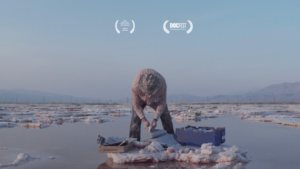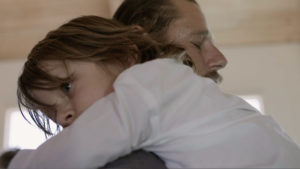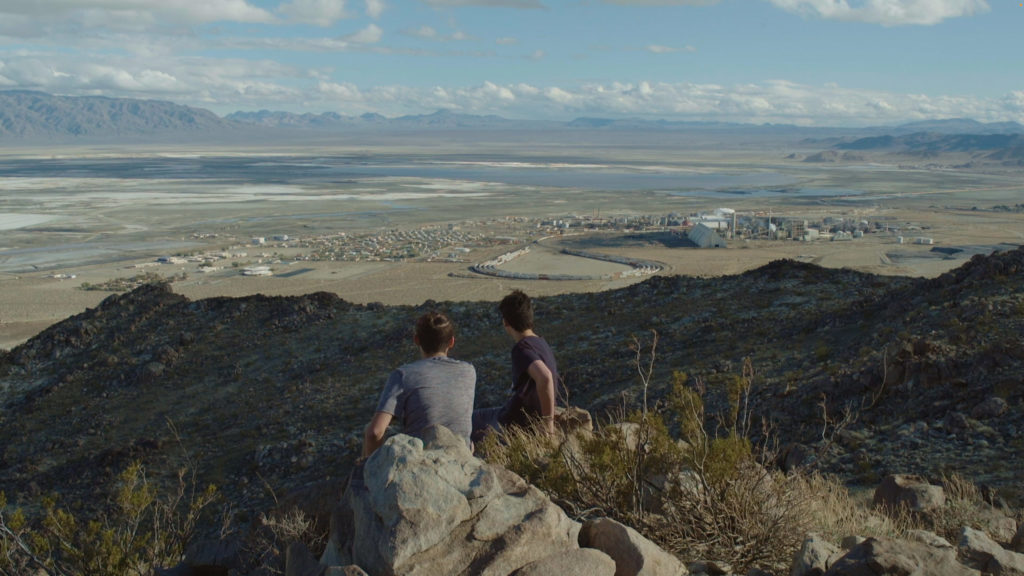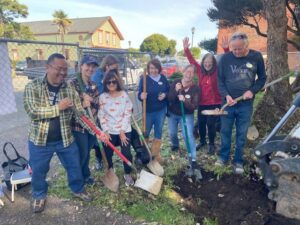 SONG OF SALT is a new documentary film about the small desert town of Trona, California, by co-directors Emma Baiada and Nicolas Snyder. Located in San Bernardino County southwest of Death Valley, Trona originated in 1914 as a company town for the borax mining industry in and around the Searles Dry Lake area. SONG OF SALT is an immersive glimpse into the struggles and celebrations of this small rural community and its roughly 1,600 residents as they look to the future and face an uncertain economy.
SONG OF SALT is a new documentary film about the small desert town of Trona, California, by co-directors Emma Baiada and Nicolas Snyder. Located in San Bernardino County southwest of Death Valley, Trona originated in 1914 as a company town for the borax mining industry in and around the Searles Dry Lake area. SONG OF SALT is an immersive glimpse into the struggles and celebrations of this small rural community and its roughly 1,600 residents as they look to the future and face an uncertain economy.
Director of Media & Journalism Programs, John Lightfoot, recently spoke with the filmmakers about Trona and their experiences producing SONG OF SALT over five years.
Tell us about Trona. What attracted you to this small rural community on the outskirts of Death Valley?
We first saw Trona on our way back to Los Angeles from a weekend trip to Death Valley. After miles and miles of driving through nothingness, we stumbled upon this giant triangular church, its cross jutting into the vast purple sky. The plants loomed in the background, sending steam to meet the smooth lenticular clouds. We noticed the town’s sulfuric smell and the tension between the natural beauty and the obvious disrepair of the homes. We got out of our car to take a few pictures but hurried back inside and locked the doors. A part of us was afraid of this place, but a more prominent part was curious. Who lives here? What happens in this town? Before we knew it, and thanks to the kindness and generosity of those in Trona, we found ourselves dedicating five years of our lives to finding out.
SONG OF SALT focuses on the lives and experiences of a tight-knit community of Trona residents. Without giving too much away, can you briefly introduce us to the film’s main characters and describe some of their struggles and celebrations?
 The May Family is a Brady Bunch-like clan living at the base of the Argus-Slate Mountain range in a large white home they are repairing. James (40) and Amellia (36) are looking for consistent work so that they can support their nine children. Of those children, four live with them full time—Sissy (4), Nickadimus (5), Atreyu (6), and Jestin (16)—often running barefoot over the dusty hills which comprise their backyard. The young kids remain naive about their parents’ ex-drug addiction and stints in prison and how those histories continue to affect their families.
The May Family is a Brady Bunch-like clan living at the base of the Argus-Slate Mountain range in a large white home they are repairing. James (40) and Amellia (36) are looking for consistent work so that they can support their nine children. Of those children, four live with them full time—Sissy (4), Nickadimus (5), Atreyu (6), and Jestin (16)—often running barefoot over the dusty hills which comprise their backyard. The young kids remain naive about their parents’ ex-drug addiction and stints in prison and how those histories continue to affect their families.
Jestin bore witness to these events firsthand and is still processing how they shaped his perception of the world. Despite the family’s challenges, The Mays live a life full of love, freedom, and adventure, delighting in the joys of dirt bikes, birthdays, and hair dye.
Tiara Freese (17) is a high school senior faced with the difficult decision of whether to leave Trona, the only place she’s ever called home, to pursue career opportunities elsewhere. A gay, African American woman who plays on the football team, she’s a rarity in town, but popular, nonetheless. She’s learning to weld and passes her time by hanging out with her girlfriend and friends, as many high school students do. Despite her skepticism that anyone on the “outside” would care about Trona, she has a lot of pride in what she sees as the town’s unique culture. “What other schools have car rallies?!”
Mary Crandall (75) is a widower who lives alone in what was once an “elite” part of town, which some now refer to as a “ghetto.” One of Trona’s most allegiant residents, she has been in town for over 60 years and is both haunted and comforted by the memory of what Trona used to be. She’s a joyful participant in the town’s many traditions and a wise witness to the town’s many changes. She exudes the warmth and acceptance that you might expect from the archetypal grandmother, and despite the downward trajectory of her town, she remains doggedly optimistic. Her laugh could cure the brokenhearted.
You describe the film as “A microcosm of contemporary American rurality… that demonstrates the complexities, hardships, and small beauties that are revealed when we look beyond prevailing stereotypes.” What do you hope audiences take away from the film about Trona and other small rural communities in similar economic situations?
We hope audiences from all walks of life can see some of themselves in these characters and maybe won’t feel so alone under the weight of today’s immense economic burdens. Many of the problems faced by those in SONG OF SALT have the same roots as those faced by people across this country. Thanks to dwindling employment opportunities and a lack of political support, their jobs have gone away, and in many ways, so have their identities—as “miners,” or “engineers,” or “linemen”—the ways in which they used to know themselves. This is a story that could just as easily have taken place in Prince, West Virginia, or Gilman, Colorado. We hope that audiences will come away with a greater understanding that rural areas are full of hardworking, loving individuals who are trying their very best to resist the downward pull of the systems they live in–all while experiencing freedom, connection, and delight along the way.
Describe your approach to the filmmaking process and telling these stories. As someone not from Trona, how did you build relationships and establish trust with the community? What were some of those relationships?
Building trust with those in Trona was of utmost importance to us. We first went to town several times, without cameras, to meet those in the community. We aimed to get to know these people as individuals, not as “characters,” and to let them get to know us. While some folks were skeptical, mainly due to poor portrayals of Trona from others in the past, most could sense the purity of our intentions, and we quickly became good friends. For example, Mary Crandall gave us the key to her house the second time we met: “I want you kids to stay with me.” Getting her stamp of approval opened many doors for us, both as filmmakers and human beings. We called her our “west coast grandma” and spent many nights on her couch, swapping stories over giant glasses of cold, boxed red wine. Working with the May Family was also a very natural process. They approached us one Sunday after a service at the Presbyterian Church and told us they wanted to take us frog hunting. Their eagerness to collaborate and share their story was encouraging and a great honor. We remain in awe of their courage to reveal so much of their lives to us and thank them for trusting us with their portrayal.
Your first screening was a sneak preview for the Trona community this past March. What was that experience like, and what was the community’s response to the film?
 Throughout the process of making the film–from the first time we entered the town with just an idea to the moment we rolled onto the high school football film with a projector and a giant inflatable screen–we were very curious about what Tronites might think. It was so important for us to treat the town and its people, whom we love so much, with immense respect. While the approach and level of intimacy may have differed from what the residents may have expected from a film about their town, we felt like if we could tell the truth (as we witnessed it) from a place of love and care, then they would approve. We very much wanted the community to be the first to see the film and we think the screening was a beautiful success. The high school bleachers were mostly packed, and the crowd was very responsive, pointing out their friends and family members on screen. It was outdoors and a bit cold and windy that evening, but everyone stayed, and we got so many lovely remarks, many of which shared a similar sentiment: “thank you for seeing us.”
Throughout the process of making the film–from the first time we entered the town with just an idea to the moment we rolled onto the high school football film with a projector and a giant inflatable screen–we were very curious about what Tronites might think. It was so important for us to treat the town and its people, whom we love so much, with immense respect. While the approach and level of intimacy may have differed from what the residents may have expected from a film about their town, we felt like if we could tell the truth (as we witnessed it) from a place of love and care, then they would approve. We very much wanted the community to be the first to see the film and we think the screening was a beautiful success. The high school bleachers were mostly packed, and the crowd was very responsive, pointing out their friends and family members on screen. It was outdoors and a bit cold and windy that evening, but everyone stayed, and we got so many lovely remarks, many of which shared a similar sentiment: “thank you for seeing us.”
Is there anything else you’d like to add?
This was one of the greatest journeys of our lives up until this point. People talk about the power of filmmaking, usually from the standpoint that viewing a film can change a person’s perspective. That can be true if done well, and we hope that SONG OF SALT may widen the worldview of a few folks out there. Still, there’s another very powerful aspect of filmmaking that we became acquainted with during these last five years, and that’s the power of the love and connection that can transpire through the process of making the film. Through this journey, we not only made a film that will stand as a testament to this time and this place, but we made dear friends and family that will forever live in our hearts and souls. So, to those in Trona—thank you for seeing us.
Visit the SONG OF SALT website to learn more about the film, the filmmakers, and upcoming screenings.
California Humanities supported SONG OF SALT through the California Documentary Project (CDP) grant program. Click here for information on the upcoming 2022 CDP deadline.





